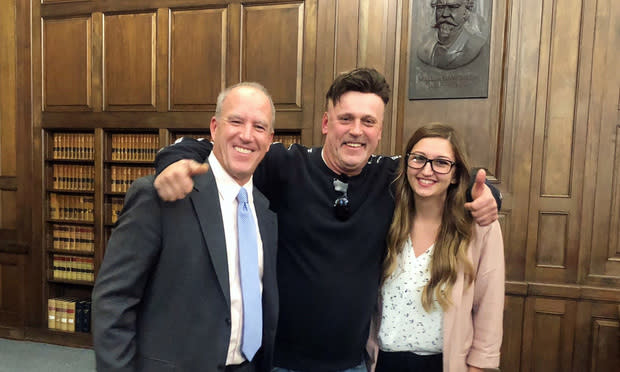Hartford Jury Awards $1.85 Million in Lead-Paint Poisoning Case

Richard Vichas, center, is shown in court after hearing he won a $1.85 million verdict in a case related to his exposure to lead paint. His attorneys, John Mills, left, and Megan Boorsma, right, are with the Mills Law Firm.
A Hartford jury has awarded $1.851 million to a painter who suffered severe lead-paint poisoning after working on a house he was told was lead-free. To date, with interest, the award is about $2.2 million.
The Nov. 8 jury award in Hartford Superior Court followed a contentious seven-day trial, which included the defendant allegedly giving the middle finger to the plaintiff in court.
After deliberating for eight hours, the six-person jury found in favor of 54-year-old Colchester resident Richard Vichas, who, according to his attorney, was emotional on the stand and broke down several times.
According to an Oct. 29 amended lawsuit, Vichas became progressively ill after painting the exterior of a house belonging to Berlin resident Timothy Heckman. Vichas worked on the house at least three days a week for seven months in 2013. He "was subsequently diagnosed with severe lead-paint poisoning as a result of the exposure to airborne lead," according to his suit.
The defense, which includes Heckman and T&T Complete Landscaping, have until Sunday to appeal the case to the Connecticut Appellate Court. Plaintiff attorneys maintain that both defendants assured Vichas the home was free of lead paint. Vichas worked for T&T at the time.
Megan Boorsma, Vichas' co-counsel along with John MIlls, told the Connecticut Law Tribune Wednesday that she expects an appeal to be filed. No money will be disbursed until all the legal avenues are exhausted.
"There is not really anything that can stand on appeal," said Boorsma, an associate with the New Haven-based Mills Law Firm. "Both defense attorneys moved for a mistrial during trial because my client stood up in the middle of trial and claimed the defendant Heckman was on the stand and flicked him off. He stood up and announced it." Boorsma said the incident occurred when the jury was in session during an attorney sidebar. It's not clear, Boorsma said, if Heckman actually gave Vichas the finger.
Nevertheless, Boorsma said, she expects that incident to be a focal point for the defense if they appeal. "I think the Appellate Court would defer to the trial judge, who decided not to call for a mistrial."
Boorsma said she believes her client's testimony during trial could have swayed the jury.
"Our client's testimony was really compelling," Boorsma said. "He is naturally very loud. He was passionate and cried on the stand. His testimony was believable in that he was lied to about the existence of lead paint and he was lied to by both defendants."
James Coyne of Shelton-based Coyne, Von Kuhn, Brady & Fries, represented T&T. Dan Scapellati, a partner with Halloran & Sage in Hartford, represented Heckman. Neither attorney responded to a request for comment Wednesday.
In court papers, the defense tried to put the blame on Vichas. It wrote that Vichas "failed to exercise due care while sanding and painting the defendant's house as a reasonable painter with specialized training would be expected to do."
Boorsma said Vichas was told by a doctor at a Veterans Administration hospital in Newington that he had the highest level of lead poisoning documented for an adult in Connecticut. That testimony was not admissible in court because it was deemed hearsay, Boorsma said.
Boorsma said Vichas' initial blood level for lead poisoning was 156 MCG/dL. The upper level for normal levels is 5, Boorsma said. Today, she said, Vichas' levels have lowered and are about 9.
Still, Boorsma said, the damage to Vichas cannot be reversed.
"He has lost 11 IQ points because of this. His brain is atrophying," Boorsma said. "He is also more likely to get neurodegenerative diseases, like Alzheimer's or Parkinson's." Other ailments cited in the lawsuit include short-term memory loss, nerve damage to both legs and chronic fatigue.
Vichas "cried multiple times" after hearing the jury's decision, Boorsma said. Currently, Boorsma said, Vichas is working as a painter on new construction projects.


